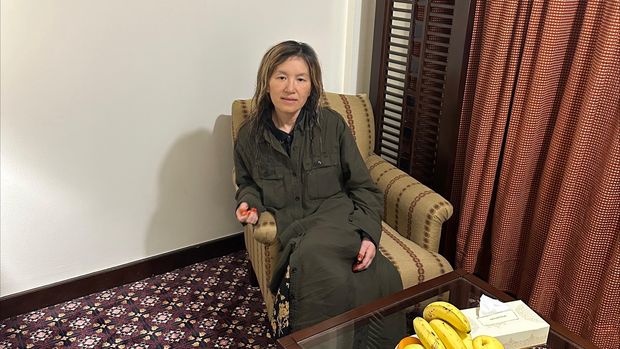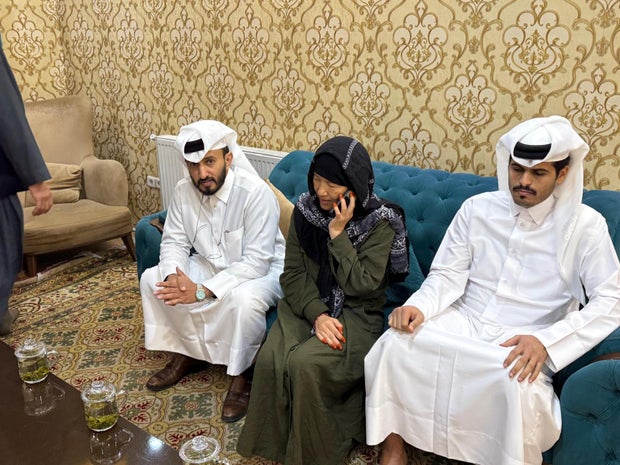An American woman was freed by the Taliban after she, two British nationals and their Afghan translator were detained in Afghanistan earlier this year, according to a source with knowledge of the matter and a former U.S. envoy to Kabul.
“American citizen Faye Hall, just released by the Taliban, is now in the care of our friends, the Qataris in Kabul, and will soon be on her way home,” Zalmay Khalilzad, who has been part of an American delegation working on Taliban hostage releases, wrote on X.
Hall was detained in February along with Peter and Barbie Reynolds, who are in their 70s, as they traveled to the British couple’s home in central Bamiyan province. The Reynolds remain in Taliban custody, CBS News learned.
Sources told CBS News that Hall was detained on charges of using a drone without authorization.
Qatari Diplomatic Source
Hall was released Thursday as part of a deal that Qatari negotiators helped broker, the source said. She was in “good health” after undergoing a series of medical checks.
Suhail Shaheen, the Taliban’s ambassador in Qatar, told CBS News that Hall was released as a “goodwill gesture.”
“Better for bilateral relations, that such gestures are reciprocated,” Shaheen said. “Actually, after (the) liberation of our country, we are in a new phase of reconstruction of Afghanistan. We want to have positive relations with (the) U.S. and other countries. This is an area which needs to be explored.”
Khalilzad posted a picture of Hall smiling with Qatar representatives ahead of her departure from Afghanistan with his announcement.
CBS News has reached out to the U.S. State Department for comment.
Qatari Diplomatic Source
The Reynolds, who married in Kabul in 1970, have run school training programs in the country for 18 years. Hall is a friend of the Reynolds and had travelled to Afghanistan in February to visit them and help them with their education training business, a member of the Reynolds family told CBS News.
The Reynolds are parents to two American citizens.
Their daughter has expressed grave fears for her father’s health and appealed to the Taliban authorities to free them. They remained in Afghanistan after the Taliban takeover in 2021 when the British embassy withdrew its staff.
Khalilzad had been in the Afghan capital earlier this month on a rare visit by U.S. officials to meet Taliban authorities, accompanying U.S. hostage envoy Adam Boehler.
Following their visit, the Taliban government announced the release of U.S. citizen George Glezmann after a deal brokered by Qatar. Glezmann, an Atlanta native, had been in custody after being detained by Taliban authorities while on a tourist visit to Afghanistan in December 2022.
The U.S. government had said Glezmaan had been wrongfully detained by the Taliban. Khalilzad called Glezmann’s release “a goodwill gesture” to President Trump by the Taliban.
Glezmann and Hall are two of several Americans to be released from Taliban custody this year.
Two Americans detained in Afghanistan — Ryan Corbett and William McKenty — were released in January in exchange for a Taliban figure who had been imprisoned in California on drug trafficking and terrorism charges.
At least one other U.S. citizen, Mahmood Habibi, is still held in Afghanistan. The U.S. has said Habibi, who holds dual American and Afghan citizenship, has been “unjustly held” since 2022.
In a public notice posted by the FBI in August 2024, the agency said it “believed” that Habibi was taken by Taliban military or security forces and “has not been heard from since his disappearance.” The FBI said in its notice that Habibi was working as a contractor for a Kabul-based telecom company when he disappeared.
The Taliban still say they do not have Habibi in custody.
“No, we don’t have him,” Taliban spokesman Zabihullah Mujahid told CBS News in January.
The government in Kabul is not recognised by any country, but several including Russia, China and Turkey have kept their embassies open in the Afghan capital.
Since Mr. Trump’s re-election, the Kabul government has expressed hopes for a “new chapter” with Washington.
Camilla Schick and
Ahmad Mukhtar
contributed to this report.





